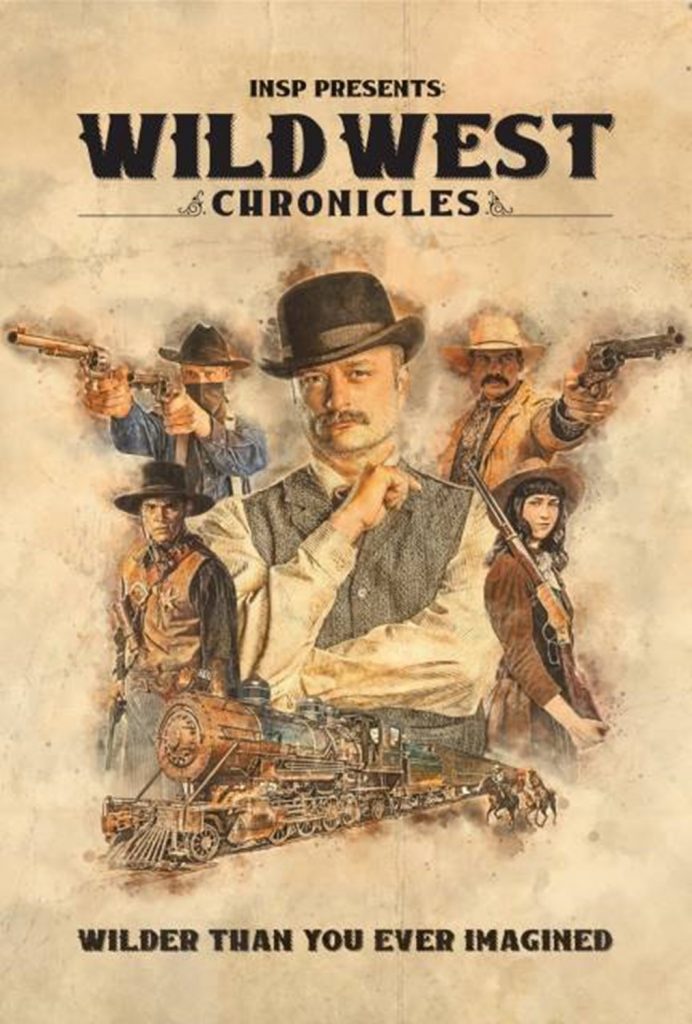The new docudrama series views Wild West legends through the viewpoint of lawman-turned-journalist Bat Masterson.
Sometimes you need a legend to uncover the truth behind other legends.
That is the arresting premise of Wild West Chronicles, an ingenious amalgamation of drama and documentary set to kick off a 15-episode run at 5:30 pm ET/4:30 pm CT Sunday, April 11, on INSP.
The series cleverly imagines a series of assignments for Bat Masterson in the late 1880s, after the Old West lawman had reinvented himself as a New York-based newspaper reporter and columnist. Each week, Masterson (played by Jack Elliott, pictured above) returns to the West to gather material — and conduct interviews — for in-depth, up-close profiles of such notables as Wild Bill Hickok, Bass Reeves, Annie Oakley, Butch Cassidy, Stagecoach Mary and Emmett Dalton. From these first-hand accounts, he aims to gather facts that often are stranger, and wilder, than fiction.
To get the story behind these stories, we reached out to two of the creative talents behind Wild West Chronicles: Craig Miller, vice president of original unscripted programming and development for INSP; and Gary Tarpinian of MorningStar Entertainment, who served as executive producer of the series.
Cowboys & Indians: So how did you hit upon this unique approach to docudrama storytelling?
Craig Miller: Gary and I had talked for a while about doing a western historical docudrama. And we sort of went through the beginning development motions, as you would on any typical docudrama. We started interviewing and assessing potential talking-head experts — and Gary compiled quite a great list, too, some of the same people that have been on Legends and Lies and The American West and other docudramas. I mean, top names in the industry. But the more we talked about it, the more it felt like we were just doing the same thing again.
C&I: And you want to stray a bit off the beaten track?
Miller: Well, from the network’s perspective, we know that our viewers really like our programming because they like to get lost in the Old West, and lost in the story. And what we were feeling sort of subconsciously was that every time we were going to cut to a talking head expert, we were going to take our viewer right out of that time period that they love so much.
So we started kicking around the idea of, well, is there a way to keep that from happening? And we decided: Acting. For instance, could we figure out a way to have as experts people from that period? They’re really actors, obviously. But they’re playing people from that period, telling their stories. So once we’re in the late 1800s, we never leave the late 1800s.
Gary Tarpinian: When Craig said, “Can we do something different?” — it was music to our ears, Because most of us who are in the creative world, we love it when we can do something a little bit different, break the mold and stretch out, because that’s why we got into the creative world in the first place. One of the things that occurred to us was that for some reason, people think, well, you really can’t tell a true story unless you do it as a documentary. I don't agree with that. I think that you can do a scripted story that may seem fictional, but based on real people — and where you cover the same beats. Like, what made them great? Where did they come from? What was their greatest moment? What do we learn from their story? All of those things can often be done better in a scripted format. So without any guilt whatsoever, Craig and I decided we’re going to tell the true story of the Old West the scripted way.
Miller: I think initially I had suggested, “Maybe we could just invent a frontier newspaper reporter who’s on that story. And he goes everywhere and anywhere to interview eyewitnesses to some of the West’s most notable events.” And Gary, who really likes things based on historical accuracy, said, “Let me chew on that for a while.” And he came back with the proposal to do…
Tarpinian: Bat Masterson.
Miller: And we just felt it would lend more credence to the overall idea. You know, Bat Masterson led a very colorful life. In fact, it seems like he had four or five lives, as buffalo hunter, gambler, army scout — and journalist.
Tarpinian: I think Craig will agree that this is a little bit of a next step for the INSP audience. Their viewers get their westerns mostly in the form of the wonderful classic TV shows that we all grew up with, like The Virginian and Gunsmoke. And all those fantastic classic films starring people like John Wayne or James Stewart — The Man Who Shot Liberty Valance, True Grit, etc. The network is taking a little bit of a gamble by doing something in this historical way.
But we like to think that by making it entertaining and having it with a scripted feel, it's going to be less of a jump to the next thing. So we’re hoping it’s going to do well. And that the audience will see what we’ve seen, which is: “This is such a rich world.” And we’re going to tell those stories of those really cool people and the cool events in that world, the best we can.















